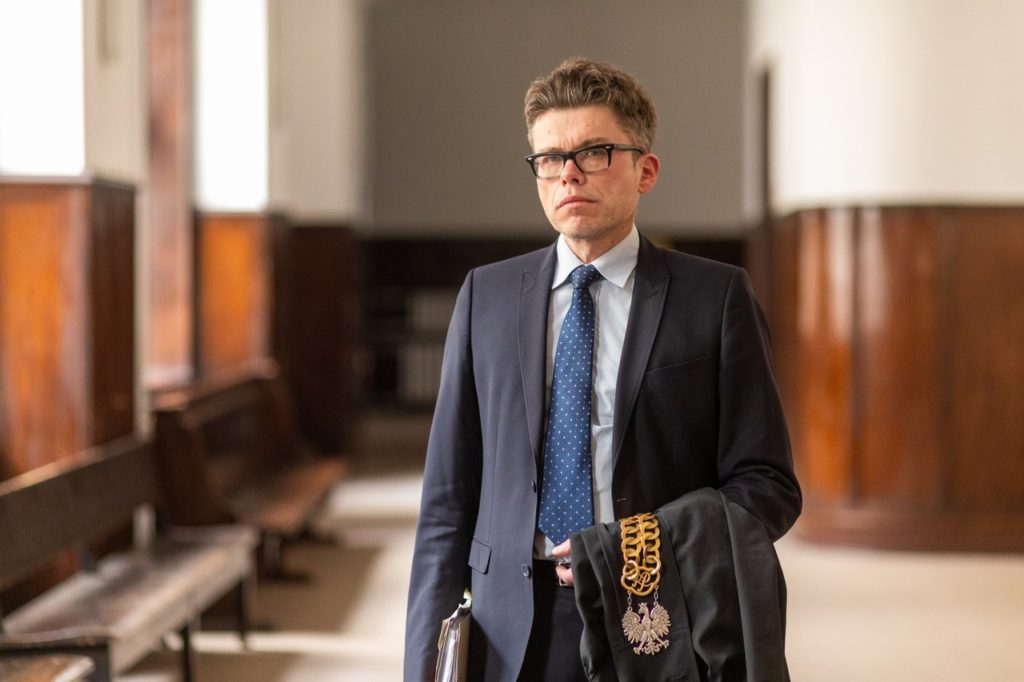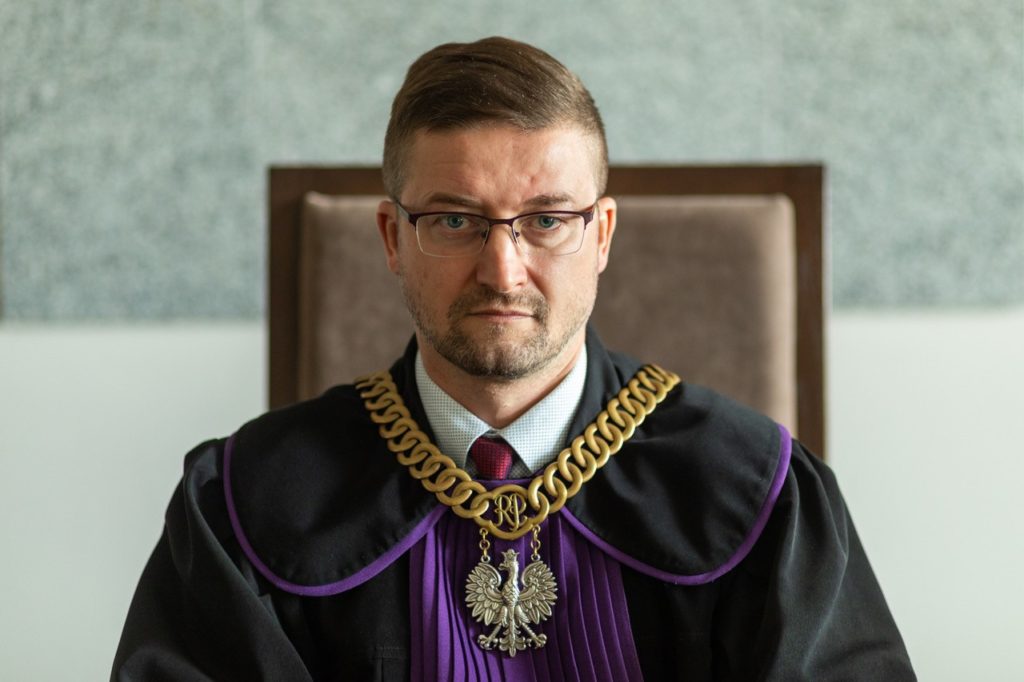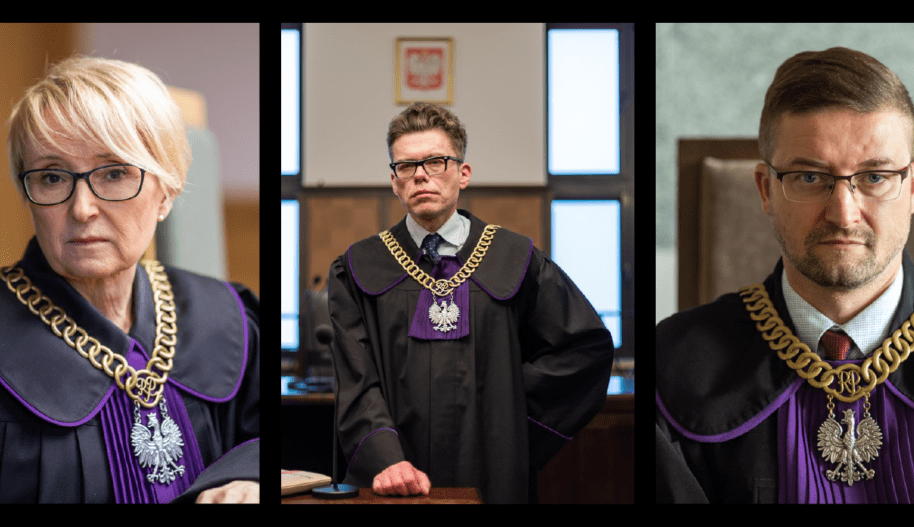Three of them: Judges Igor Tuleya, Paweł Juszczyszyn i Beata Morawiec. Why they have chosen this occupation? How is it to decide on cases of other people and their lives? Why they fight so hard for independence? From where they take their strengths?
Their stories illustrate what is happening in Poland since 2015, the graduate restriction of people’s freedom through depriving them of mechanisms that protect them from abuses of power. One of those “ramparts” are judges, independent from political power. There are no “justice reforms” in Poland because reforms are supposed to serve people and not to turn against them. The actions of the authorities do not intend to improve the justice system but to subordinate it to people loyal to political authorities.
Fight for an independent judiciary resembles David’s struggles with Goliath
Three brave judges decided not to sit quietly and look how piece by piece the country based on Constitution and human rights is destroyed. By deciding to fight for these values, they risked losing their jobs and reputation.
The state declared war against them and used their graves tools. Politically controlled disciplinary spokesman and Disciplinary Chamber of the Supreme Court waived their immunity, suspended them from work and banned them from working as judges. Criminal investigations were initiated. Against Judge I. Tuleja for order he issued. Against Judge B. Morawiec in reprisal for publicly speaking, that the hidden goal of the activity of the Minister of Justice, was not the reform of justice but subordinating judges and choosing the ones that are loyal to the authorities.
The fight of light and dark side of force continues
Regardless, the judges do not lay down their arms. They do not give up. They decided to initiate proceedings against their pursuers as well. Judge Beata Morawiec sued the Minister of Justice for blackening her name by accusing her of corruption. Judge Paweł Juszczyszyn sued the Disciplinary Chamber of the Supreme Court for forbidding him from working as a judge. They bravely protect their impartiality.
There are many more similar cases of the judges, who do not allow for illegitimate actions and accusations. The cases chosen by us are just a tip of an iceberg when it comes to threatening judges and the authorities. In the judicial environment, it is supposed to create an effect of not standing up in fear of repressions from the authorities.
Get to know their stories!
We hope that getting to know those judges closer as normal, decent people and not just as heroes from the headlines on the Internet and TV, where they talk about complex legal procedures, will let you answer the question: “Is it worth to be decent?”
Fight for independent judiciary concerns all of us. Irrespectively of the political authority, the right to court is a fundamental human right. We all can complain about courts, we even may not like them but it does not change the fact that we need independent courts and judges to fight for our other rights.
Do you want to wake up in a state, where authority uses subordinated courts to control people? If authority continues to restrict courts’ independence, we can lose the shield protecting our rights.
„Authority wants to subordinate or dominate all life in our country, in all the aspects. The fight is for the culture, fight with the free media, worldview fight. And how chairman Kaczyński said: these courts are the last barricade, to make own vision of the state come true”*, said Judge Igor Tuleya.
If you do not want that to happen – you also get to the fight!
Why we need independent judges?
„We Judges are the guards. We have to make sure the authority does not become the absolute authority so that the citizen would not become Józef K.
(…) First, you eliminate, destroy or turn into their opposite institutions of the democratic state that block turning of the authority into tyranny. Constitutional Tribunal, Supreme Audit Office, Ombudsman, Supreme Court. Then you eliminate the guards.
A variety of the repressions are used: from hard ones, like waiving the immunity, initiating disciplinary proceedings (…), to eliminating from the office, taking away the offices, secondment to other offices. Among the others spreads the fear, that tells them to be indifferent and to turn a blind eye (…).
And when the guards are gone, the citizen has no chances. (…). The authority can do with him or her everything and (s)he can do nothing. (S)he cannot appeal, go to somebody with a complaint, well unless it is the committee of the ruling party.
That is why, we judges stand up together defending independent courts, impartial judges, so that citizens could keep their freedom. Without free courts, there will not be free citizens.”
Michał Lewoc – Judge in the Regional Court of Legnica.
THE STORY OF IGOR TULEYA
Igor Tuleya
Judge since 1996
Criminal Department, Regional Court of Warsaw
You cannot steal free courts from free people.
Judge Igor Tuleya

You can say that Judge Tuleya had a bad luck – he adjudicates in Warsaw, in the Regional Court, where go all political cases. He does not choose those cases, they get to him from a draw. He has to decide – while not listening to everyone around him, shouts of the opposition, threats from the authorities, pressures, flashlights and the politics lost in endless arguments. According to his conscience – so how he sees this and understands the law, applies to all of us.
And he understood the law so that when he decided that there is an abuse or irregularity, he called a spade a spade.
Prosecutor’s office strikes back
In retaliation for these statements, in which he pointed to irregularities in authorities’ actions, the prosecutor’s office made a criminal allegation concerning disclosing information from the investigation, which were supposed to threaten further proceedings. In reality Judge’s Tuleya “crime” was ordering a PUBLIC session (the judge has a right to do so). Before starting the session, journalists apply for permission to record the session and a prosecutor present on the sitting did not object.
Acting under law, judge Tuleya allowed the media to record the verbal justification of the court’s decision. It resulted that the prosecutor twice discontinues the proceedings regarding irregularities during sessions of Sejm (lower chamber of Polish Parliament) in 2016.
In November 2020, the Disciplinary Chamber of the Supreme Court – not an independent and impartial court, acting against the ban from the Court of Justice of the European Union from April 2020 – waived the immunity of the judge, so that the prosecution could make allegations.
Judge Tuleya consistently rejects to cooperate with the prosecution
The Judge has been called on hearing three times and three times he failed to show up at the prosecution, even though each time he was in front of the building. He showed that he is not hiding but that he does not respect the decision of the Disciplinary Chamber, which was banned from making decisions.
„Prosecutor called me on interrogation. I could not know. It would be cowardice. I would contradict myself. I would not be able to look Free People, the defenders of the law, in the eyes. Tamely taking part in the hearing, I would legitimize illegality. I would admit that everything is okay. And it is not. Prosecutor said he would get me with force. I am calm because I believe in what I do”.
Maybe we are powerless but we are not vulnerable. And today, and always I will repeat: it is worth defending values. And in their defence, it is worth paying any price. Until we are fighting – we are the winners. Behind those clouds, there is a sun and even after the longest night, there will be a new day. I am sure of that.”* – says Judge Tuleya.
Admittedly, on 21 April 2021 Disciplinary Chamber of the Supreme Court did not permit the request of the National Prosecution to forcefully bring Judge Tuleya to a hearing in the matter of the charges put against him regarding disclosing information from the investigation. It is not however the end of the Judge’s struggle with politicised prosecution and Disciplinary Chamber. The prosecution plans to sue the decision of not permitting to forcible bringing of Judge Igora Tulei for the hearing.
Our vigilance is still needed. Let’s look at the hands of the authority, to not wake up in the state, where a judge ends up in the prison for the texts of decisions he makes.
The glamour and price of the judge’s work
In the judgement of Judge Tuleya: “Profession of the Judge is a service to a society for the various technical aspects of the judge’s work. Probably it is not worth bothering with those but maybe someone does not know that we have to be fully disposable, we have shifts, on holidays and days off. Those shifts are calculated into our job and there is no extra remuneration. Cases that we decide are with us even in our free time. Some cases go along the judge for many years, some I will remember for my whole life. Just as the first murder case in the district court. I felt the burden and I was praying not to make a mistake and make a just sentence and solve the issue well. A judge has to solve the issue of blame in their conscience and he takes it on his shoulders.”
We often hear threats in the courtrooms directed to us. Life sentece evokes rage. If not the police convey, the the judge had his head ripped off.
How judge Tuleya sees the current role of a judge in society?
“In front of us, the new model is created – civil judge. He is not closed in courtroom anymore, he does not restrict his activity only to sentence and its justification. A judge should go out to citizens, meet with them and take about what he is doing. He should also learn from citizens, have a dialogue with them about changes in law and judiciary. It is important. This way – I believe – the authority of a judge is built and trust of citizens to the justice system”* – summarised Judge Igor Tuleya.
THE STORY OF PAWEŁ JUSZCZYSZYN
Judge since 2001
Judge of the Regional Court in Olsztyn

How does it feel when you want to work but you are prevented from doing so?
Is it normal for a judge to fight for more than a year to be able to do his work?
It was so peaceful…
Judge Pawel Juszczyszyn had been peacefully ruling at the Olsztyn court for 18 years, until, in 2019, he came across a certain case in which he had to decide whether a judge who had previously passed a sentence had been properly appointed to the position in the first place.
Such a duty of scrutiny arose for all judges due to an order previously issued by the Court of Justice of the EU.
Integrity at work does not pay off?
In order to investigate the matter thoroughly, judge Juszczyszyn wrote to the Chancellery of Sejm, requesting the necessary documents – letters of support for the judges currently sitting on the National Council of the Judiciary. These were necessary in order to check whether the persons that nominated the new judges were themselves appointed in accordance with the law. It turned out that this seemingly simple procedure of requesting a document could not, in the current situation, be carried out.
Sejm denied the judge access to lists of supporters for the NCJ
But it did not end there. This demand triggered an avalanche, which led to judge Juszczyszyn paying a high price for his inquisitiveness: he temporarily lost his job (he was suspended and removed from the court, he was transferred back to a lower instance court (district court)) and a disciplinary action was launched against him.
What was all of this for?
Nevertheless, the judge remains strong – he does not intend to abandon the profession. He keeps fighting for justice, with a firm conviction that it is worth it. He underlines how, without independent judges, the wall protecting us from the authorities is crumbling:
“At the moment, certain violations of law committed by people linked to the ruling party are not prosecuted at all. Expressions of civic attitudes that conflict with the interests of the ruling party are prosecuted ruthlessly, even beyond the law. However, the courts, always defending their independence, rule in favour of citizens, and are critical of police actions, especially in cases concerning freedom of expression, including manifesting one’s views on the streets, to which we have a constitutional right ” – says judge Paweł Juszczyszyn.
Salami tactics and the boiled frog syndrome
In limiting our human rights by taking over the courts, the authorities use a “salami tactic” which is well known from the times of the USSR and was used after World War II. Step by step, the authorities are disarming successive institutions and individuals who serve as a shield against the government’s temptations, just like slicing salami. In the beginning it was the Constitutional Tribunal, which was staffed with the so called “double judges”, favourable to the authorities. This was recently held to be a violation of, among other things, our right to a fair trial. What followed were changes in the structures of the Supreme Court, the common courts and the prosecutor’s office.
This is reminiscent of the ‘boiled frog syndrome’: when a frog is thrown into boiling water, it jumps out of it in immediately. However, if the frog is placed in lukewarm water and slowly heated, its vigilance will be dulled and the frog will eventually boil unnoticed. The same happens when we imperceptibly lose the allies of our rights and freedoms. At some point we may realise that the water is scalding – but it is already too late.
The fight in such conditions is neither spectacular, nor does it bring a clear victory. But this is exactly what creates even stronger need for determination and solidarity.
“I am afraid that there will not be enough determination – above all in society – to fix this situation; that such a state of corruption of the law and the justice system will last for many years. Because there will be arguments that for the sake of peace, for the sake of stability, let’s leave it as it is. Let’s draw a thick line and do what we can to build something good for the future. However, the future cannot be built without a strong and healthy foundation, without an independent judiciary. So we cannot accept a situation in which politically appointed judges sit in courts,” says judge Paweł Juszynczyszyn.
Impartiality, independence – meaning what?
We tend to think that it is best if the court decides the case in the only correct way, that is, in our favour. A just verdict (clearly, in our favour) is based on impartiality, independence, objectivity, and fairness in the examination of the case. The court is supposed to be well-balanced and resistant to influence. So perhaps it would be better if instead of judges, cases were decided by artificial intelligence? It does not know anyone, it has no sympathy or dislike for anyone, it has not been appointed by anyone and it does not owe its position to any party. Would that be perfect impartiality and independence? What about the human sense of fairness, the understanding of law, the pursuit of justice?
“Humanly speaking, a person will say: ok, this judge was bad, because he ruled against me, and the court of appeal was good, because it found in my favour. However, looking at it from a broader perspective, both the court of the first and second instance have fulfilled their function. Each court decides according to its own conviction and its own understanding of the law. Because the law is subject to interpretation. All this is done in order to achieve justice” – says judge Paweł Juszczyszyn.
THE STORY OF BEATA MORAWIEC
Judge since 1990
Judge of the Disctrict Court in Cracow
President of the “Themis” Judges Association

Judge Morawiec – a woman who is not afraid of the Minister of Justice
It all started in 2017 when the Minister of Justice – without a word of explanation – dismissed Judge Beata Morawiec from her position as President of the District Court in Krakow, interrupting her term of office.
Subsequently, an announcement concerning Judge Morawiec appeared on the website of the Ministry of Justice. The message implied that Judge Morawiec, as president, had improperly supervised the directors of the court and, as a result, corruption had taken place in the court. This was supposed to be the reason for the dismissal.
Judge Beata Morawiec sued the Minister of Justice, Zbigniew Ziobro, for infringement of personal rights. She demanded an apology for the content of the published announcement.
Judge versus the Minister of Justice – 1:0
In January 2021, the Warsaw Court of Appeal decided in favour of Judge Morawiec, finding that there had indeed been a violation of her good name, and ordered the minister to issue an apology. However, the minister does not want to apologise and has announced that he will appeal the judgment to the Supreme Court.
Apart from this court battle, which so far has not been to the liking of the Minister of Justice, another tactics was soon adopted. The public prosecutor’s office, which is subordinate to the Minister of Justice, has initiated criminal proceedings against Judge Beata Morawiec. The prosecution claims that in 2013 the judge received PLN 5,000 for the preparation of a court opinion that she never drafted, and that she accepted a mobile phone as a bribe to rule in favour of the defendant. The judge again strongly denied these allegations and presented expert evidence.
Uninvited guests at 6am
On 18 September 2020, a prosecutor assisted by the Central Anti-Corruption Bureau (CBA) entered the house of Judge Beata Morawiec after 6.00 a.m. Threatening to search the house, he took away a business laptop containing sensitive data. The reason was to secure this “non-existent” opinion from 2013 and the electronic media on which it was drawn up. The warrant to search the judge’s home was issued without the consent of the disciplinary court, even though the judge declared that she had a copy of the opinion and could make it available at any time. Risking a long career in law by accepting the alleged bribe in the form of a phone is hard to believe. Moreover, the allegation of a fictitious court opinion was refuted by Judge Beata Morawiec with an expert opinion from an IT specialist, which shows that the legal opinion was indeed written in 2013.
The criminal charges against Judge Morawiec emerged when she became involved in a conflict with the Minister of Justice. In addition, she proved that the information was manipulated by winning a case for infringement of personal rights. In addition, she is the widely recognised president of the “Themis” Judges Association, which is highly critical of the changes introduced in the judiciary.
The rule of law – meaning what?
“As a professional group we isolated ourselves and were isolated from the society. We did not actively participate in its life. This was a mistake. Therefore, now that the rule of law is being destroyed systemically, we must put much more effort into making citizens aware that we cannot allow the destruction of the rule of law. To make them understand what the rule of law is. Because ‘the definition of the rule of law is very simple: it is the application of the law. Nothing else. Obey the law, apply the law, you will be a man of the rule of law. If you manipulate the law or don’t obey it or disregard it, you are not a member of civil society”, explains Judge Beata Morawiec.
When a judge herself stands trial
In October 2020, the Disciplinary Chamber of the Supreme Court lifted Judge Beata Morawiec’s immunity so that the prosecution could pursue criminal charges for her alleged corruption offences. Judge Morawiec’s counsels appealed the Chamber’s decision, so the case is still pending and the judge is still covered by immunity.
It is worth remembering that in this type of case it is not only the protection of the personal interests of the judge that is at stake, but also the good of the entire justice system. If we assume that judges perform the function of public trust, then the unjustified waiver of their immunity causes the entire judiciary to totter.
“The authority of independent judges and independent courts, built up over many years, has been destroyed. What will happen next? It will be very difficult to correct the mistakes made and to rebuild respect for the judiciary, respect for the judges. But we will no longer remain silent and watch idly as the rule of law is destroyed.
A side effect of the actions of those currently in power, completely unforeseen by them, is this existing resistance among the judiciary, an environment that is unanimous and that fights for civil rights together – shoulder to shoulder. Nobody expected it, because we have been unprepared for it for years. ‘Sit in a corner and they’ll find you’ is how we were taught, ‘don’t speak out because it’s not appropriate, it’s not proper’. ‘A judge must not get involved in the society’. These – as life has shown – are the most irrational theses that have led to legitimate criticism of our professional group.
However, reality has verified many erroneous assumptions, and the destructive attempts of those in power have come to nothing. Fighting for the rule of law has always been, is and will be the goal of every independent judge ” – declares Judge Beata Morawiec.
In April 2021, Judge Morawiec filed a lawsuit with the labour court, in which she demands reinstatement and security for the claim, i.e. permission to work while her case is pending. She is not laying down her defence.
On 8 June 2021 the Supreme Court Disciplinary Chamber refused to waive the immunity of judge B. Morawiec. As a result of this decision, she was able to return to ruling in court. The judge also withdrew her previously filed suit for reinstatement. We are pleased that this case has been concluded successfully!
[*] – quotes of the statements by judges Igor Tuley, Paweł Juszczyszyn and Beata Morawiec for Piotr Wójcik as part of the “Justice” project.
Header photos: Beata Morawiec, Igor Tuleya, Paweł Juszczyszyn. Copyright. Piotr Wójcik, photos from the “Justice” project.
Full interviews can be read on the website of Piotr Wójcik’s project “Justice”.


